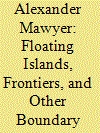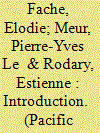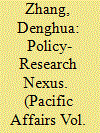|
|
|
Sort Order |
|
|
|
Items / Page
|
|
|
|
|
|
|
| Srl | Item |
| 1 |
ID:
178283


|
|
|
|
|
| Summary/Abstract |
Papua New Guinea’s first deep-sea mining project, once touted as the first of its kind in the world, now appears to be “dead in the water.” The mining company behind it has been liquidated, the mining equipment has been rendered obsolete, and the host government has been made to look foolish for supporting the enterprise. This paper examines the application of two concepts—that of the “resource frontier” and that of the “actor-network”—to reach an understanding of the history of this apparent failure. By elaborating on the additional concept of a “network junction,” it seeks to show how arguments about the feasibility or fallibility of this particular project, and deep-sea mining proposals more broadly, have been related to arguments about a range of other issues in which scientific and technological uncertainties are associated with environmental and social impacts or environmental and political risks. Instead of seeking to explain the failure of this project by reference to the attributes of a specific type of maritime resource frontier, the paper shows how the articulation of different policy networks creates the appearance of a frontier in which human and non-human actors have combined to produce a variety of unpredictable and open-ended outcomes. From this point of view, the history of this project’s failure cannot simply be read as the outcome of a contest between two groups of human actors with clearly defined interests or ideologies, nor does it necessarily spell the end of the policy network in which this project has been embedded.
|
|
|
|
|
|
|
|
|
|
|
|
|
|
|
|
| 2 |
ID:
178284


|
|
|
|
|
| Summary/Abstract |
Technological advances have challenged numerous social and political domains over recent decades, including the materialities and imaginaries of islands and islandness in Oceania. Since the early 2000s, a plurality of schemes, discourses, politics, anxieties, and hopes have coalesced around the possible construction of artificial islands, referred to as floating islands, floating nations, floating cities, or seasteads, depending on the new islands’ imagined purposes and peoples. If achieved, these new, de novo, islands will contribute to an ongoing regional geopolitical remaking that requires urgent attention. However, in examining floating islands as boundary objects, this article suggests that, even if never realized, they are exceptional points of focus for perceiving and reflecting on the uncanny, disruptive character of capital at work in the contemporary Pacific Islands in tension with multi-state regional policy initiatives for collective governance and sustainable ocean management. Moreover, this article argues that floating islands are not the only “artificial islands” producing tensions between communities, states, and international ocean governance frameworks. Deep-sea concessions for mineral exploitation, the spatialization of high-seas fishing rights, and large- and small-scale conservation zones similarly raise issues of the fixity or fluidity of territoriality, sovereignty, rights of access and restriction to common or uncommon marine spaces and their resources, as well as conflicting imaginaries and ideologies around the ocean and Oceania as an open frontier.
|
|
|
|
|
|
|
|
|
|
|
|
|
|
|
|
| 3 |
ID:
178280


|
|
|
|
|
| Summary/Abstract |
Over the last decades, the Pacific Ocean has been the locus of an unequalled rush for space and resources involving intertwined public and corporate interests, external powers, and Pacific Island states and territories. This rush is driven by three intersecting motivations aiming to: (1) exploit marine resources; (2) protect marine biodiversity and mitigate the effects of climate change; and (3) establish sovereignties over marine spaces. In this context, the fluidity of saltwater environments gives rise to specific issues of enforcement, control, and governance. This special issue examines these reconfigurations of/in the Pacific Ocean, stressing potentially conflicting frontier processes, in the light of a structuring tension between trends of ocean grabbing and ocean commoning.
|
|
|
|
|
|
|
|
|
|
|
|
|
|
|
|
| 4 |
ID:
178282


|
|
|
|
|
| Summary/Abstract |
This paper interprets the disrupted establishment of the Kermadec Ocean Sanctuary, a 620,000 square kilometre marine protection area, as a crucial moment in Pacific frontier making. The development of large-scale protected marine areas is a politically charged frontier tool, in which states garner international recognition and environmental renown by setting aside large swathes of their exclusive economic zones. In the Kermadec Sanctuary, this enclosure hit against an assemblage of Indigenous histories, ecologies, repatriated fishing rights, and privatized fishing quota challenging the oft-marginalized agency of Indigenous people in frontier narratives. This paper argues that three factors are fundamental to untangling this conflict: first, the historical trajectory of terraqueous territorialization in the Kermadec region, second, the post-Treaty of Waitangi settlement dynamics of Māori marine environments, and third, the common ecosystem services model underlying conservation and extraction.
|
|
|
|
|
|
|
|
|
|
|
|
|
|
|
|
| 5 |
ID:
178279


|
|
|
|
|
| Summary/Abstract |
China has substantially increased its engagement with Pacific Island countries since 2006, driving heightened geostrategic competition between traditional powers and China in the region. Research on Pacific Island countries by Chinese scholars has grown rapidly in recent years, but this development and its relationship with policy needs are little-known outside China. By analyzing the 129 journal articles published by Chinese scholars on Pacific studies between 2006–2019, with supporting interviews, this research aims to expand the debate on the policy-research nexus, especially in the Chinese context, by introducing Pacific studies in China. It argues that official policy needs have largely shaped Pacific studies in China, and that researchers who seek to influence policy-making tend to find the process slow and indirect. This research will also improve our understanding of Chinese scholars’ intellectual support of China’s Pacific diplomacy on certain topics.
|
|
|
|
|
|
|
|
|
|
|
|
|
|
|
|
| 6 |
ID:
178278


|
|
|
|
|
| Summary/Abstract |
Since the early 2000s, Japan has witnessed the growing salience of so-called netto uyoku (online right-wingers). This group is characterized by strong anti-China and anti-Korea sentiments, nationalistic political views, and online political engagement. While online radical right movements in Europe are often regarded as support bases for radical right candidates or parties, few studies have investigated whether this assumption applies to Japanese online right-wingers. The present study sought to shed light on this issue by conducting a large-scale web survey with 77,084 respondents living in the greater Tokyo metropolitan area. Respondents were registered monitors for a research company. The large sample size enabled multivariate analyses to clarify the characteristics of online right-wingers in comparison to other respondents. The results indicated that 1.5 percent of the respondents (1,167) could be classified as online right-wingers and, in contrast with the political discontent hypothesis, most online right-wingers had a high degree of external political efficacy and lower levels of populist attitudes relative to other respondents. This suggests that online right-wingers trusted and remained satisfied with the current political conditions. Furthermore, they were more likely to vote, especially for established conservative parties, suggesting an affinity among online right-wingers for traditional conservative parties and candidates. These findings indicate that, unlike in Europe, Japanese online right-wingers are not a support base for radical right candidates and parties. In Japan, which is under a right-leaning government, online right-wingers have not become a driving force for emergent radical right parties.
|
|
|
|
|
|
|
|
|
|
|
|
|
|
|
|
|
|
|
|
|